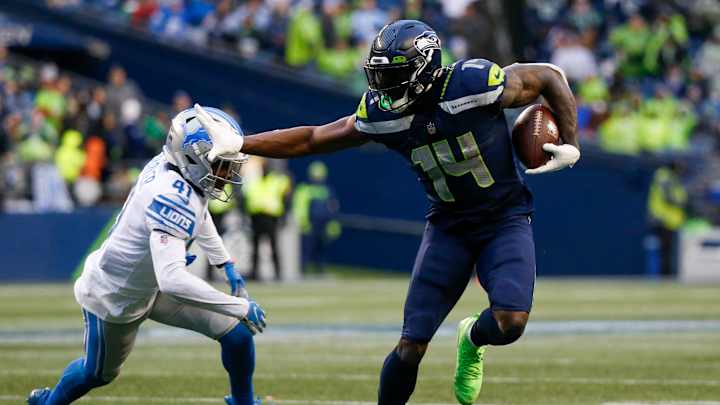DK Metcalf: Revived Run Game Changing How Defenses Play Seahawks

RENTON, WA - After struggling to score points all season long due to injuries and struggles converting on third down among other factors, the Seahawks have found their footing a bit offensively over the past month, scoring at least 30 points in three of their past five games.
What's been the secret to Seattle's offensive resurgence? Improved play from a healthier Russell Wilson has certainly helped, but as receiver DK Metcalf noted on Thursday, the revival of a once-dormant rushing attack spearheaded by breakout star Rashaad Penny and a mauling offensive line has been a true game changer of late.
“We’re seeing mainly a lot more one-high than we have in the past. The running game hasn’t really been there for us," Metcalf said. "We’ve seen a lot of two-high which is taking away the passing game. Knowing Rashaad Penny is able to do what he does and then you’ve got DeeJay Dallas and [Travis] Homer coming in there and backing him up, it really just puts a lot of stress on the defense to worry about the run and the pass. It just basically has opened us up a lot more for big pass plays.”
For most of the 2021 season, the Seahawks have struggled to find consistent production out of the backfield. Chris Carson went down with a neck injury and while Alex Collins rushed for over 100 yards in a loss to the Steelers in Week 6, he battled his own abdomen issue over the past two months. Penny battled through calf and hamstring injuries himself, playing in just three of the team's first nine games.
But since entering the starting lineup in Week 14, Penny leads the entire NFL in rushing yards with 481, nearly 100 more than the next player on the list in Steelers running back Najee Harris. He's averaged nearly seven yards per carry, the highest mark for any player with more than 30 carries during that span, while rushing for a league-best five touchdowns.
No longer able to spit on Seattle's run game with Penny ripping off explosive run after explosive run, according to TruMedia, Metcalf and his fellow receivers have seen a small uptick in single-deep safety coverages with a Week 16 loss to Chicago serving as the lone exception.
Interestingly, the Bears deployed Cover 6 on 35.8 percent of the time and used two-deep safety scheming more than 50 percent of their defensive snaps. Penny still had a big game rushing for 135 yards on just 17 carries, but Wilson completed less than 60 percent of his passes and finished with under 50 passing yards and no touchdowns in the second half as the Seahawks wound up losing 25-24 in the closing moments.
In the other three games Penny has started, however, teams have leaned more heavily on single-deep safety sets to try and counter Seattle's rushing attack. The Texans ran Cover 3 and Cover 1 on 74 percent of their snaps, the second-highest percentage called against the Seahawks in a single game this year. The Rams and Lions dialed up Cover 3 and Cover 1 at 56.6 and 54.9 percent rates in their games last month.
All three of those rates exceed the average for Seattle's first 12 games when opponents used single-high sets 54.7 percent of the time. Most notably last weekend, this has created more ideal coverages for Metcalf and his teammates to win downfield, even if they haven't been able to execute on all of those opportunities. Wilson has been more efficient in that time as well, throwing eight touchdowns and just one interception.
While the debate rages on regarding the value of running the football in the NFL, the Seahawks have proven in the past that they have a much more potent offense when Wilson and his receivers have a strong ground game complementing them. Based on Penny's performance and how defenses have been forced to adjust as a result, that looks to once again be the case and illustrates the importance of a balanced attack to dictating the coverages opponents play against them.

Graduating from Manchester College in 2012, Smith began his professional career as a high school Economics teacher in Indianapolis and launched his own NFL website covering the Seahawks as a hobby. After teaching and coaching high school football for five years, he transitioned to a full-time sports reporter in 2017, writing for USA Today's Seahawks Wire while continuing to produce the Legion of 12 podcast. He joined the Arena Group in August 2018 and also currently hosts the daily Locked On Seahawks podcast with Rob Rang and Nick Lee. Away from his coverage of the Seahawks and the NFL, Smith dabbles in standup comedy, is a heavy metal enthusiast and previously performed as lead vocalist for a metal band, and enjoys distance running and weight lifting. A habitual commuter, he resides with his wife Natalia in Colorado and spends extensive time reporting from his second residence in the Pacific Northwest.